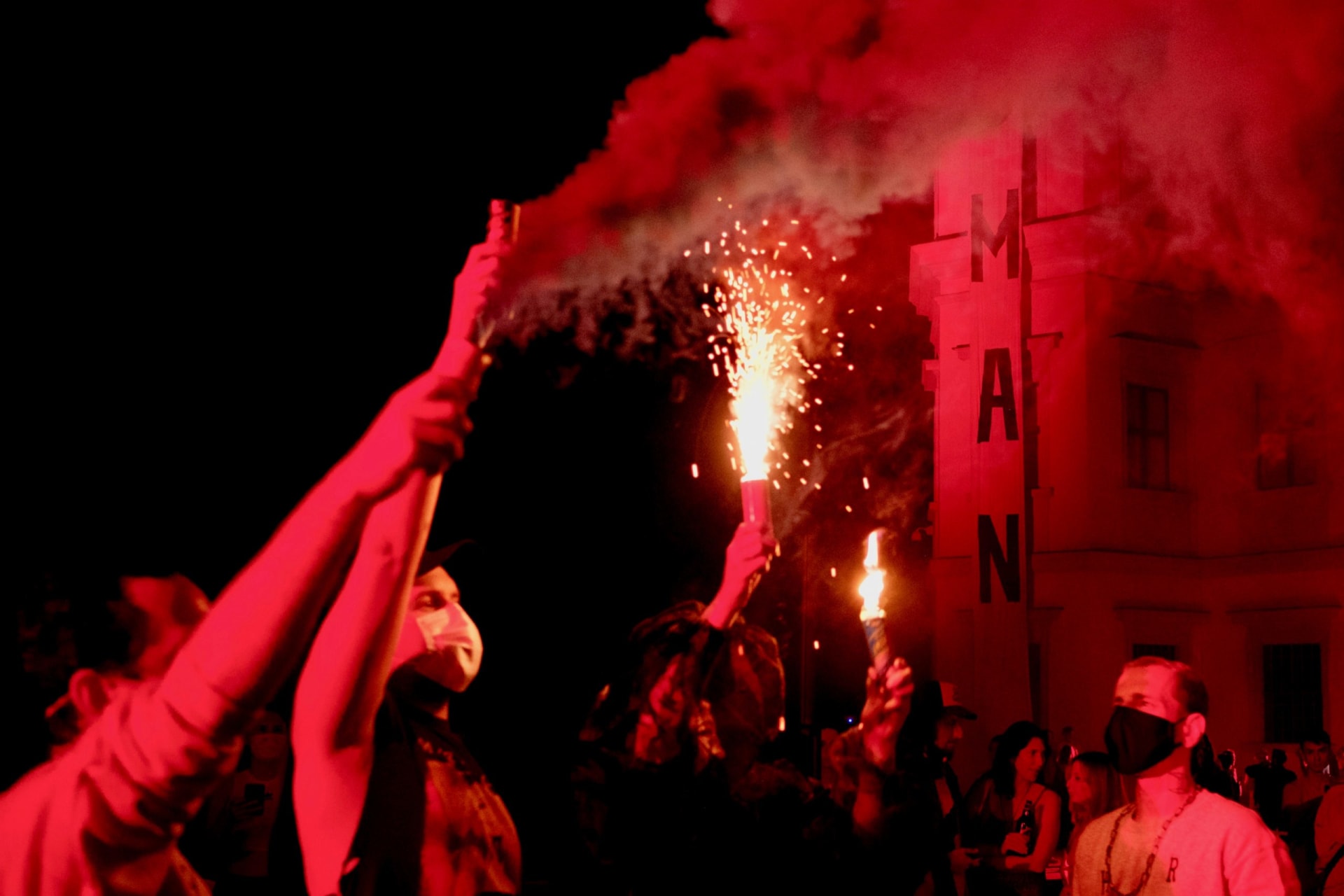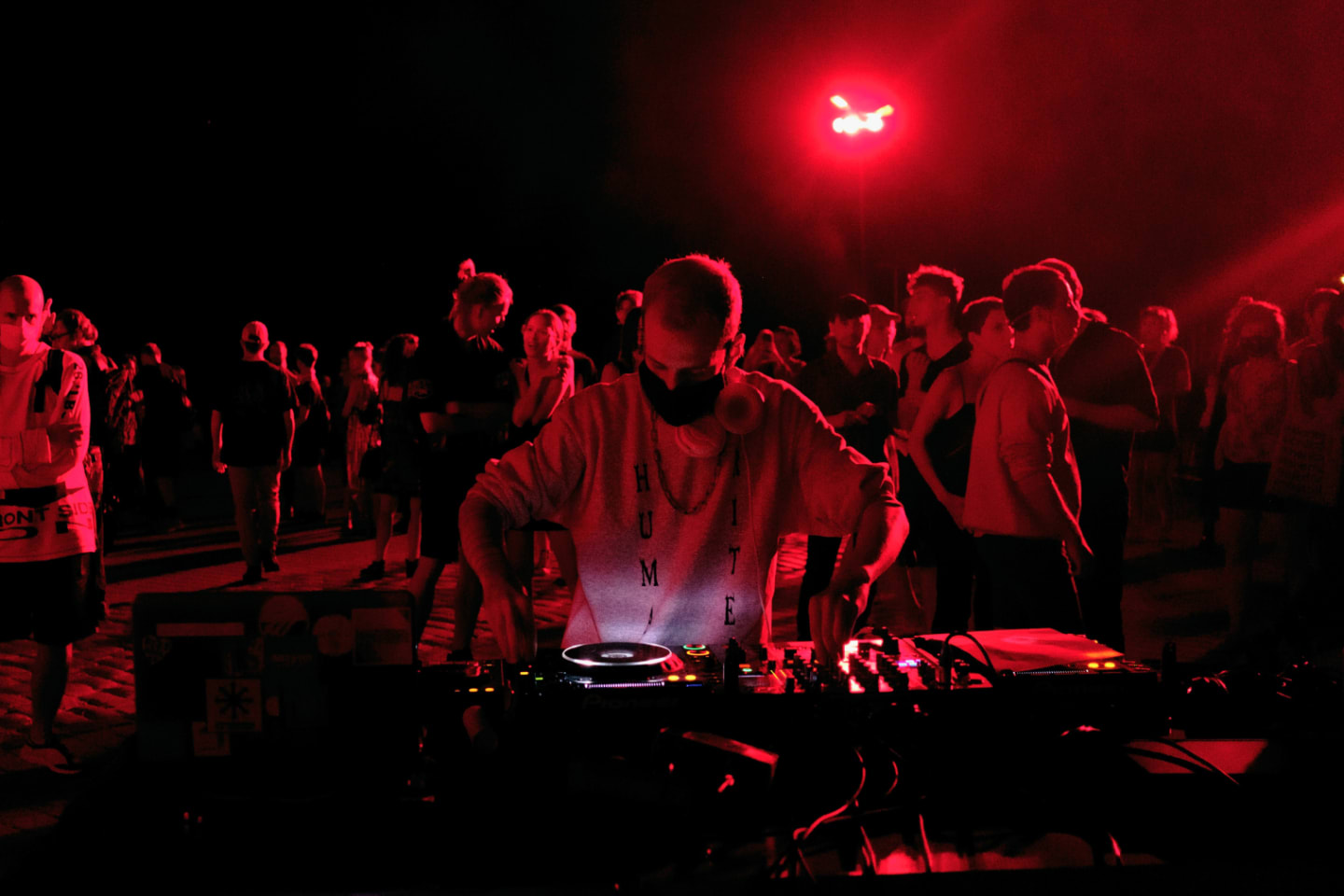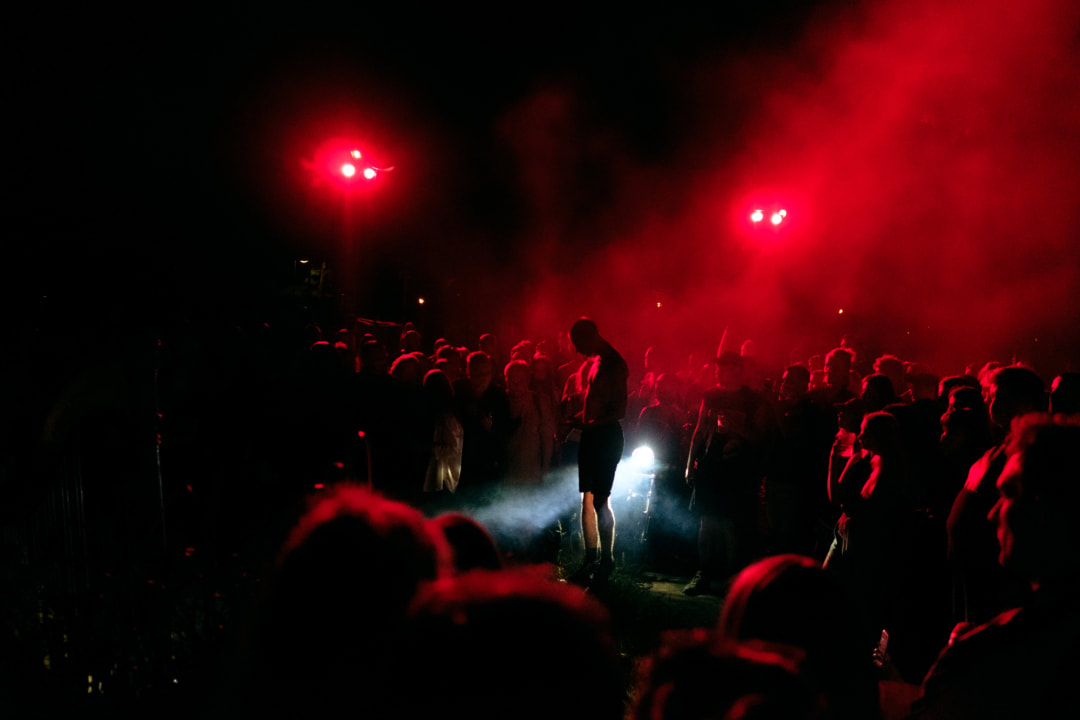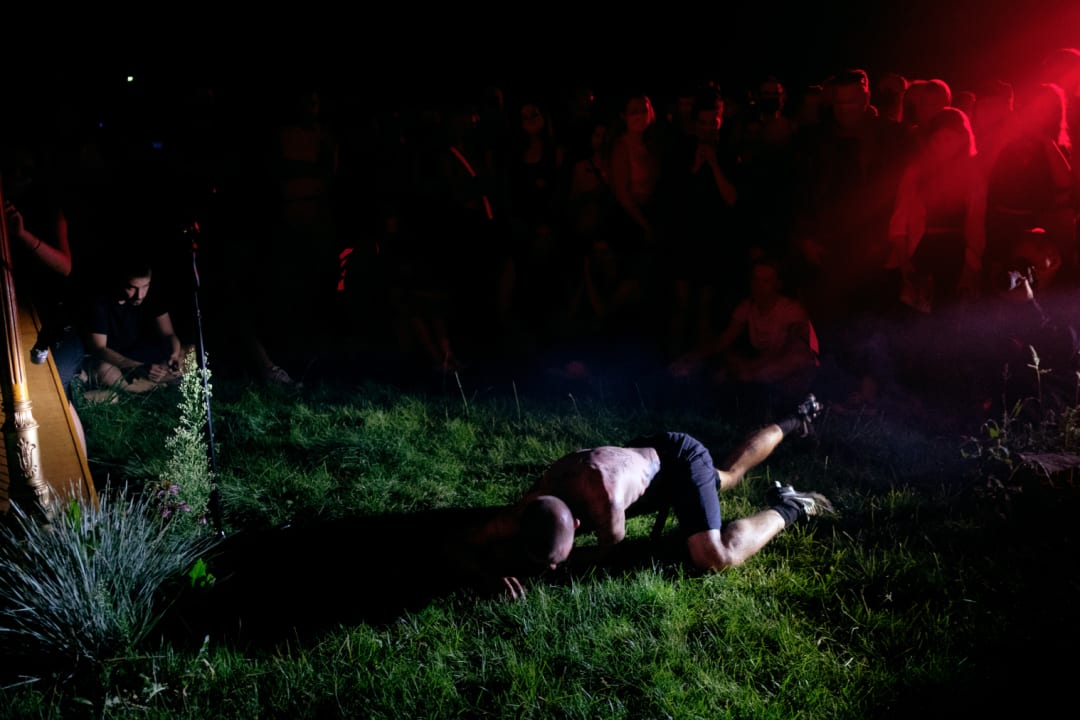
Poland’s Experimental Club Scene Is a Refuge for LGBTQ+ People
Socially-conscious collectives are leading queer-focused workshops, safer space practices, and educational podcasts in acts of solidarity.
Last month in Poland, banners with the words “We dance together, we fight together,” accompanied by hand-painted rainbow flags, swept across city squares. Figures from the Polish club scene such as VTSS, as well as members of Projekt Lab, Oramics, and Brutaż proudly presented these signs—echoing the same slogan as the 2018 Bassiani protests—to show their allegiance with the queer community as they protested against homophobic police brutality and the August 7th arrest of Margot Szutowicz, co-founder of the feminist and LGBTQ+ activist group Stop Bzdurom. This is only one of the many examples of how the local experimental music scene, from Kraków and Warsaw to Poznań and Gdańsk, is unifying in response to the political circumstances.
Since the 2015 elections, the country has undergone a wave of anti-gay sentiments, resulting in a third of Polish municipalities declaring themselves as “LGBT-free zones.” In contrast to other countries, such as Germany, where pride events take place every year, such celebrations, like the first parade in Bialystok, have been met with intense backlash. Earlier this year, vans funded by the pro-life association Fundacja Pro spread a campaign equating homosexuality with pedophilia across Poland. As of now, LGBTQ+ people are still denied the ability to enter into same-sex marriages or civil unions, and, under domestic law, hate crime protections do not currently extend to attacks motivated by gender or sexual identity.







Polish music activists have mobilized in the latter half of the past decade in counteraction to a spike in anti-LGBTQ rhetoric or what Polish feminist philosopher Ewa Majewska termed the “proto-fascist politics of exclusion.” Within her impassioned speech on the country’s LGBTQ+ arts community during an online panel for Unsound Festival, Majewska deemed the so-called “LGBT ideology” as a “floating signifier”—a concept with no specific reference or agreed-upon meaning to arouse political action for better or, in this case, for worse. Majewska praised the local music scene’s embrace of feminism and progressive ideals—and for good reason. Whether it’s through vocalizing support of Black Lives Matter, standing in solidarity with the citizens of Belarus, denouncing the political subjugation of immigrants, or rising together against the ultraconservative term “LGBT ideology,” these music activists continue to show their alignment with global protest movements, intertwining an ethos of a critical rave into their musical practices.
These activists have also found innovative methods of creating alternative realities where sonic liberation can thrive. The collective Oramics, for example, was founded in 2017 to promote women, non-binary, and queer people within the electronic music scene, with members spanning throughout Central and Eastern Europe. One member, Zosia Hołubowska, a Warsaw and Vienna-based queer, non-binary musician combining post-punk, dark wave, and dance genres under the alias Mala Herba, founded “Sounds Queer?” in 2015–a series of workshops, podcasts, and performances to empower “people to pick up electronic music as a way to express themselves and challenge not only the rules of music, but gender norms.” By exploring unconventional methods of electronic music production, Hołubowska has led workshops reclaiming the pejorative term “queer”—allowing participants to experiment with Ototo and modular synths and Ableton Live.
Another Oramics member, Paulina Trzeciak (AKA dogheadsurigeri), a DJ who also belongs to the MESTIÇO collective, found her own call to arms when she began playing out in 2016. Citing her initial boredom of industrial bass, 4/4 techno, and trance sounds of Warsaw’s commercialized techno scene, Trzeciak reports that she and MESTIÇO were among the first socially-engaged music groups to play deconstructed club and “new club” sound that brought together everything “from furious techno to Jersey club, hard drum to gabber, and more.” All of a sudden, “playing a pop remix on the dance floor didn’t have to be ironic,” she says, and the freedom to wield these unexpected sounds led her and cadre to “redefine club culture in general.”



“We raised an entire new audience [on this] music,” Trzeciak tells me. She, alongside her other collectives, utilized this loyalty to spearhead “a generation of people who started treating the dancefloor as a political space.” Since its genesis in 2017, Oramics have been educating their clubgoers on safer space practices, a measure that has steadily trickled upstream to more established clubs. After associating themselves with venues like Pogłos—a venue that openly proclaims a “No homophobia, no racism” policy—Oramics began setting their sights on larger, more well-established venues throughout the country. Between 2017 and 2019, the collective led workshops teaching staff members from Projekt Lab in Poznań and BAL in Kraków on how to cultivate open-minded environments for their patrons. Leading round-table discussions with promoters and venue employees, Oramics sparked a series of brainstorming sessions to help venues implement safer space policies. “This was a breakthrough phenomenon within the scene,” Trzeciak says.
This new underground considers sound as a medium for self expression. Its de facto motto is: “Don’t be afraid to be yourself.” One by one, such engaged cooperatives as KEM, Oramics, MESTIÇO, and Brutaż proved that the dancefloor could effectively serve as a forum for experimental creation, and an outlet for frustrations in a politically disparate climate. This scene is one of the very rare places in Polish society where LGBTQ+ people are able to find inclusivity and understanding for their experiences. Although promoters are increasingly open to socially-conscious environments and outré sounds, finding financial support for this scene remains an obstacle.

Justyna Banaszczyk, who produces IDM and experimental electronic music under the name FOQL, and co-runs the label Pointless Geometry in Warsaw, as well as Poland’s first independent community radio, Radio Kapitał, tells me, “The biggest problem of the independent art, music, and club scene in Poland is its lack of sustainability. We are pretty much invisible to mainstream media and institutions—we are not treated as part of the culture. The real culture in Poland is ‘high art’.” Everything else, she says, is not considered to be serious or significant. These independent platforms are integral resources for not only the continued livelihood of the experimental music scene, but as a platform for queer artists to carve out autonomous spaces for self-expression and creativity.
The amount of grants for cultural infrastructure from Poland’s Ministry of Culture has increased dramatically in the past ten years. That being said, according to the study “Culture and the Structural Funds in Poland” by Pro Cultura Foundation, the distribution of these funds are mostly directed towards opera houses, museums, theatres, and concert halls. On top of that, local promoters are caught footing the bill for foreign DJs who have not adjusted their fees to match local ticket prices. Polish club-goers are not willing to pay more than five Euros or around 20 Złoty for a club night. International music magazines have also turned a blind eye to the Polish experimental club scene. In a study conducted by Oramics, less than three percent of podcasts of the leading electronic music magazines featured Polish artists in the past three years. Struggling with funding and visibility, the Polish experimental club scene has had no choice but to amplify one another.

This is the reason why FOQL—who recently joined the 2020 roster of forward-thinking artists on Shape Platform—founded Pointless Geometry in 2015 with the aim of showcasing and boosting independent Polish talent. Pointless Geometry’s limited-edition cassette tapes and audiovisual projects on VHS are a testament to this, with each release designed by a local visual artist. A standout is Jakub Lemiszewski’s “TORUŃ VIBES” analog release, paired with Clutter Goth’s graphic design. Lemiszewski fuses off-kilter, high-octane percussive rhythms with futuristic, synthy high notes journeys, throwing in heavily distorted bass and choral-like harmonies for good measure. Meanwhile, Clutter Goth’s accompanying design on the cassette tape is equally as dreamy, bright, and acidic—with 3D motifs of ambiguous entities caught between liquid and solid forms drifting across a craggy terrain. FOQL comments on the DIY-spirit of Pointless Geometry: “We treat tapes as a medium to listen to music, not as a vintage gadget you can put on the shelf. The quality of recordings is very important to us. Most of the work related to cutting out the covers and assembling the tapes are done at home.”
By loading the content from Bandcamp, you agree to Bandcamp's privacy policy.
Learn more
After only a year of launching Radio Kapitał in 2019, the non-profit, independent community radio is planning to expand with a studio in Łódź. Commenting on Kapitał’s unprecedented success, FOQL adds, “We have to say the plan seems to have worked and there’s a new point of reference for local actions.” With the help of an extensive list of individual patrons, Radio Kapitał broadcasts a variety of subversive programs such as “Old Wave” with Adam Kaliszewski and “Let’s Talk About Sex” with Bia Sadowska. Kaliszewski’s podcast features playlists of queer figures in new wave, postpunk, and synthpop to educate the public that such a history in music does, in fact, exist. With Sadowska, she leads critical conversations surrounding queer visibility and acts of aggression against the LGBTQ community. FOQL goes on to explain how Radio Kapitał’s success shows that independent music movements are a phenomenon that exist throughout the country—and not just in the capital. At the moment, she says, “We’re trying to slowly return to local scenes, decentralize our actions and build new ecosystems for the circulation of independent culture in Poland.”
In a nation and, more broadly, a world that continues to validate epistemic violence against marginalized people, the Polish experimental music scene has fully embraced music as a signifier for their shared values. These music activists are taking it upon themselves to reimagine and implement alternative realities—where they can sustain their own musical practices and, at the same time, lift one another up in their respective communities. In this regard, the Polish experimental music scene is proving to be a tour de force—pushing the boundaries of electronic music, while using solidarity as their weapon of choice. As FOQL puts it, “I believe in people and community. Call me naive, but decentralized direct action is the only way for social change—and art is the tool for me.”

Published September 11, 2020. Words by Jocelyn Yan, photos by A. Chmielewski, Filip Preis, Helena Majewska & J. Gawliczek.
